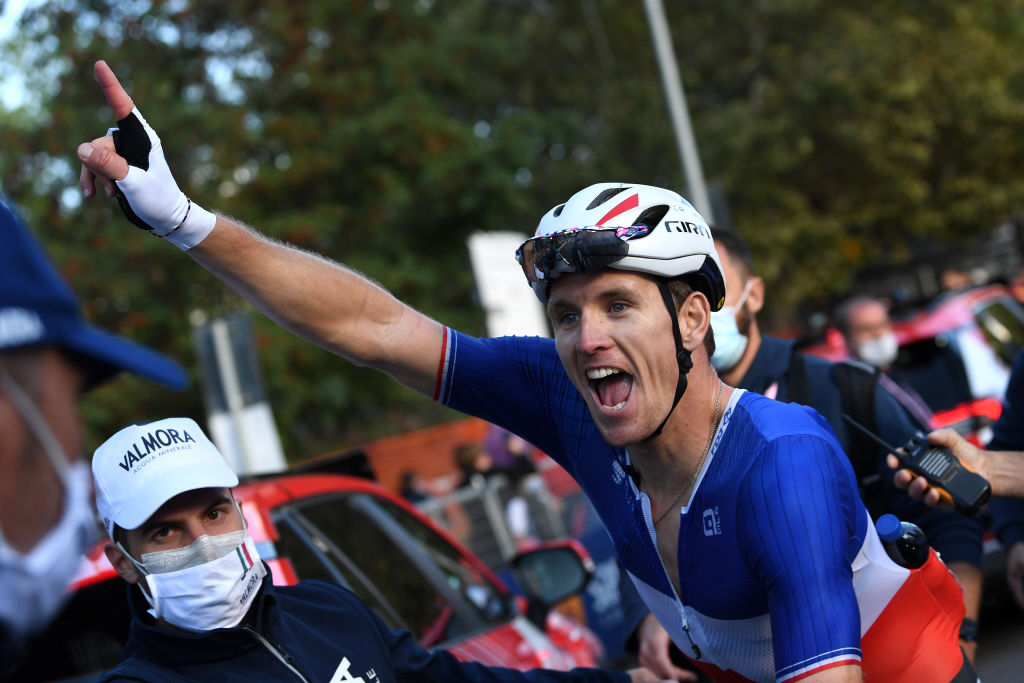Démare goes from millimetre to metre margin in second Giro d'Italia sprint win
Frenchman gets a huge gap in Matera, takes ciclamino jersey from Sagan

The one press conference question that best summed up the scale of Arnaud Démare's second bunch sprint win in the Giro d'Italia on Thursday was when somebody asked if the French fast man had seen the photo finish of his victory. The gaps were such that Démare was the only rider visible in it.
The Groupama-FDJ racer said he had not seen the photo, "where all you can see is the rider and his shadow," as the Giro d'Italia translator poetically put it, but Démare admitted that taking a victory as he had done, by several bike lengths, was "something very special, particularly given the depth of the sprinters' lineup here in the Giro."
Thursday's sweeping victory was all the more remarkable given that on Tuesday's stage 4 in Sicily, Démare had taken the win by just a few millimetres, and he'd admitted that some hefty slices of luck on various accounts had helped him take his first Giro stage win 48 hours ago.
But on Thursday in Matera there were no such fluky moments, with strategy and strength both playing equally important parts in Démare's 11th win of the 2020 season rather than a confluence of good fortune.
Groupama-FDJ were notable by their near-absence from the leading positions in the rolling, sometimes very technical, run-in to the finish, with Bora-Hansgrohe and Jumbo-Visma doing the lion's share of the work. Démare said that he had told his teammates to stay "hidden" at that point in the game and to avoid using up energy in the strong headwinds in order to be all the fresher for the finale.
A finish as segmented as Matera - the undulating approach roads, the steep climb with 3km to go, the twisting downhill that followed and the final kick up to the line - was almost certain to produce an unusually complicated pathway to victory. And Démare confirmed despite the proportions of his win, getting to the point where he was able to crush the opposition so convincingly had been anything but straightforward.
"On the run-in, like my teammates, I stayed behind, on the wheels, as well, and then in the last part when we entered the city, my teammates brought me up close to the front, so that with three or four kilometres to go I was well-positioned," he recounted.
Get The Leadout Newsletter
The latest race content, interviews, features, reviews and expert buying guides, direct to your inbox!
"But on that short, steep hill I really suffered and the only way I got through it was by telling myself that the last two kilometres were flatter and easier for me. After the climb, [teammate] Simon Guglielmi wanted me to go up to the front, but I told him I had to recover first. Once I'd done that, I got on Astana's wheels, and I didn't touch my brakes.
"Finally, with 200 metres to go, I decided to go for it. Once I started, I realised that nobody would be able to get past me."
Démare recognised that Thursday was a very different kind of sprint to the one in Sicily on Tuesday where he had been "really close to the limit. This kind of finish, an uphill false flat kind, is something that suits me very well when I'm on good form."
Even so, Démare's confidence in his options at Matera had changed several times since he first sat down with a route book prior to the Giro, and worked out which days he would have some kind of option on winning.
"Before the Giro, I had classed the stages as possible sprints and non-sprints," he said, "and up to yesterday [Wednesday] morning, I thought it was the former.
"But then, after yesterday's really hard day in the mountains and all the efforts we'd made, this morning at the team briefing, I said I thought it would be too hard to win. But then, again, when we actually got into the stage and started riding, when I realised there was a headwind that strong, I thought the break was bound to come back, and we laid our plans for the sprint."
Having repeatedly thanked his Groupama-FDJ team, Démare said that, as is often the case with sprinters, having boosted his morale with one victory, that added confidence and helped push him towards taking another.
"I always said if I won the first one, there'd be more," he concluded. And on Friday in Brindisi, a stage of the 2020 Giro that seems specifically designed for sprinters, there could well be a third.
Alasdair Fotheringham has been reporting on cycling since 1991. He has covered every Tour de France since 1992 bar one, as well as numerous other bike races of all shapes and sizes, ranging from the Olympic Games in 2008 to the now sadly defunct Subida a Urkiola hill climb in Spain. As well as working for Cyclingnews, he has also written for The Independent, The Guardian, ProCycling, The Express and Reuters.
